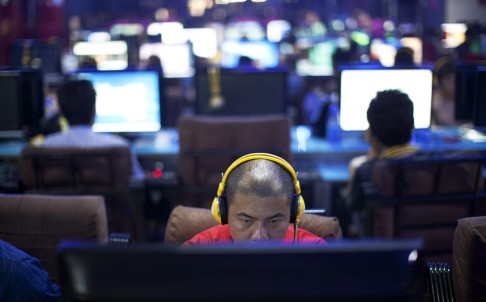Chinese internet giant NetEase accused of rumour-mongering, spreading pornography
PUBLISHED : Tuesday, 03 February, 2015, 2:06pm
UPDATED : Tuesday, 03 February, 2015, 7:19pm
Agence France-Presse in Beijing

A man surfs online at an internet cafe in Beijing. The government is strengthening censorship and controls over cyberspace. Photo: NYT
One of China’s biggest internet companies has been accused of rumour-mongering and other offences by the Communist authorities as Beijing furthers its online clampdown.
The government’s Cyberspace Administration of China said in a statement that the authorities had met with representatives of NetEase to discuss “problems” in the company’s operations.
The internet firm, which provides online games, education and email services, was accused of “illegally republishing news and information, spreading pornography, rumour-mongering and other issues”.
No details were provided of the alleged violations.
NetEase has its origins in the freewheeling southern province of Guangdong and users say that the comments sections on its news stories are less strictly censored than those of other firms.
A NetEase official said the company would work to “actively spread positive energy and provide news services in strict accordance with the law”, according to the statement.
The move appears to be the latest effort by the Communist Party to exert control over the internet.
Beijing maintains a tight grip on information, with the media controlled by the government and social networks subject to heavy censorship.
Hundreds of bloggers and journalists have been rounded up since 2013 in a government-backed campaign against “internet rumours”.
China’s top court announced last October that it was putting pressure on internet service providers to give the personal details of web users suspected of “rights violations”.
The authorities have also cracked down on virtual private networks, or VPNs, which allow internet users in China to get round the country’s vast censorship apparatus, known as the Great Firewall.
The Cyberspace Administration said the internet authorities in Beijing have also recently called in the heads of other top Chinese online firms, including Sina, Sohu and Baidu and urged them to “take corrective measures”.
“Some websites take a lax attitude towards content published for the sake of profit and sometimes spread pornography, vulgar content and bad information, which has disrupted the orderly flow of online information and damaged the public interest,” the administration statement said.
